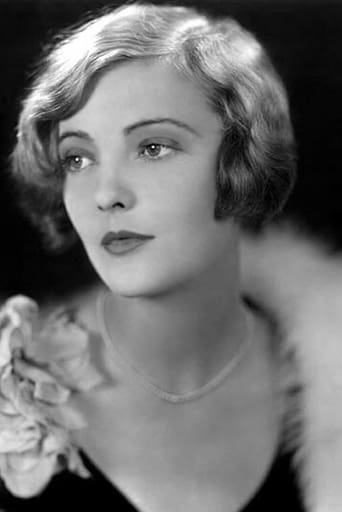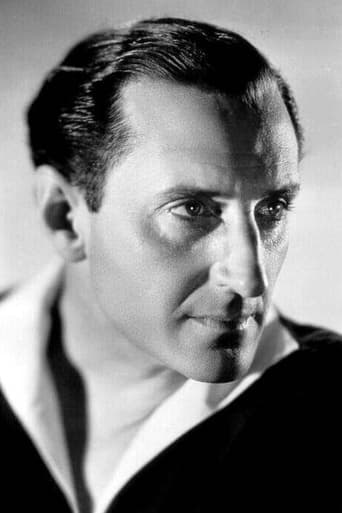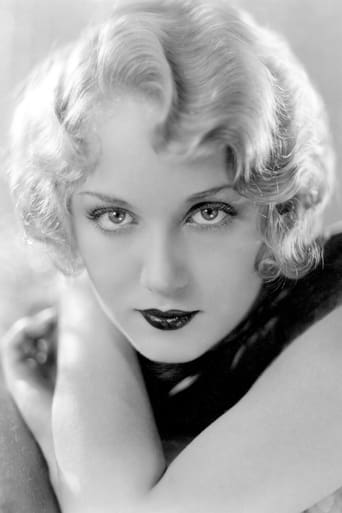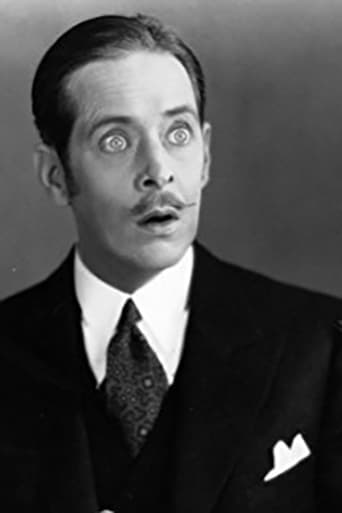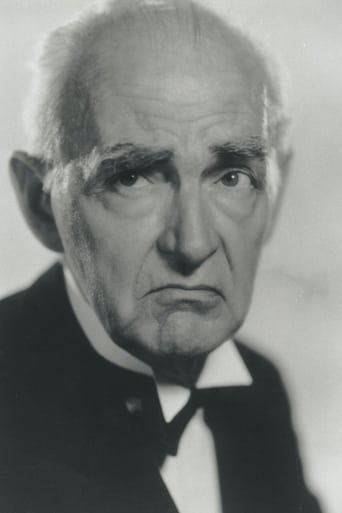SpuffyWeb
Sadly Over-hyped
Cleveronix
A different way of telling a story
BelSports
This is a coming of age storyline that you've seen in one form or another for decades. It takes a truly unique voice to make yet another one worth watching.
Jenna Walter
The film may be flawed, but its message is not.
marcslope
...and he's quite dashing, a tall charmer of exquisite phrasing and mellifluous voice. Here he's a military man who, for complicated plot reasons, receives a love letter from a woman he never met. That's Dorothy MacKail, now utterly forgotten, but a quite popular and capable Follies beauty who starred in a number of early talkies. She's an heiress who has had to invent a fiancé so her younger sister can wed, and her total fabrication of a love letter has been delivered to Rathbone. It's a slightly stiff early-talkie drawing room comedy of scant surprise and pedestrian direction, by William A. Seiter, and has a not terribly interesting supporting cast; best is Emily Fitzroy, as a tippling aunt. But MacKail and Rahbone were always worth watching, and they do strike sparks as they spar and deceive one another. An OK hour and a half, and if it makes you hungry for more Dorothy MacKail, that's understandable.
calvinnme
...because I think "The Flirting Widow" is an early talkie delight, practically an ancestor of the screwball comedy. The setup of the story is this - Faraday (Claude Gillingwater) is an English gentleman with three daughters. The middle daughter has already married and now the youngest daughter,(Flora Bramley as Phyllis), wishes to marry Bobby (Anthony Bushell). But Faraday is old fashioned, the type that believes daughters should marry in order of age so that the older unmarried sisters are not branded spinsters. Faraday breached this law once, but he won't do it again for Phyllis. Celia (Dorothy McKaill), the oldest must marry first. Unfortunately, Celia dresses in drab manly fashions and even wears her hair slicked back like a boy, has no suitor and wants none. Her family hasn't made it easy for her to socialize either, because with her mother deceased, it has pretty much fallen to Celia to organize the servants and make sure all of the household supplies are purchased and paid for.When Celia returns home from a house party she has been to and hears Phyllis' problem, she comes up with an answer. She claims she has become engaged to a fictitious Colonel she met at the party, and he has sailed that day with his regiment to Arabia. What Celia plans to do is wait until Phyllis is married and then place a death notice in the papers saying her fictitious fiancé has died in combat. In the meantime, being engaged, she is now free to socialize like the younger daughters, she spruces up her wardrobe, literally lets down her hair, and becomes the attractive Dorothy McKaill we are accustomed to seeing.But her female relatives are too nosy. They demand she write "Wobbles" - her fictitious pet name for Colonel "John Smith". She does and thinks that she has tossed the letter into the fire. What she doesn't know is her sisters do her a favor, look up Colonel Smith (Basil Rathbone) in the military registry, and mail the letter for her. Yes, Col. Smith actually exists, receives this letter from the fiancée he did not know he had, and is so intrigued that he decides to meet Celia in person. Imagine his surprise to find, when he reaches the Faraday home, that he is not only engaged, he is dead too! Dorothy McKaill did not surprise me here - she's always been able to project a range of emotions. The real surprise here is Rathbone who proves himself very able at comedy. Emily Fitzroy, who usually plays wicked older women, is hilarious as Celia's aunt Ida who means well but has a weakness for brandy. If Claude Gillingwater had lived longer and been a tad bit younger, he would have played the kind of roles that Charles Coburn got later on.The only thing that hurts the film is the pace is just a bit slow - but not bad at all if you realize that pacing was one of the things with which all of the early talking films had trouble. Highly recommended.
davidjanuzbrown
This is one movie I flat out disliked. It is without question that worst movie of Basil Rathbone's career. I do not agree that early Rathbone's was bad ( see him as Philo Vance in 'The Bishop Burder Case'), but here he was. What is frightening he was the best one in it. Dorothy Mackaill as a leading lady was the absolute worst. Ugly, boyish, and boring. Despite being British she did not even use her natural accent which stood out as well.( at least Lelia Hyams ( Evelyn) tried). I forgot to mention it was stagy as well, and they had this guy named Faraday who I wanted to punch , that is how bad it was.Spoilers ahead( not that they are needed that is how predictable it was). Mackaill 's character Celia, and Rathbone's Colonel Smith do end up together ( not that I would want her anyway). Here is the most frightening thing: it is not even the best movie from First National in that Era with the word FLIRT in the Title. Next year's "The Naughty Flirt" is way better. Especially when contrasting the looks and acting ability of Alice White and Myrna Loy compared to Mackaill. Was 'The Naughty Flirt' a great movie? No but compared to this dog a classic. ZERO. Stars
moonspinner55
Long-forgotten release from First National Pictures has a fairly hoary plot, but will surely be of interest to fans of sassy Dorothy Mackaill, real-life Ziegfeld Follies star who attained quite a following in the late 1920s. She has the lead here, playing a woman who invents a lover after her family pressures her to marry. Despite the presence of Dorothy (mercurial as ever) and co-star Basil Rathbone, there's not much excitement in this flimsy scenario. Film-historians and movie buffs of the Pre-Code Era might take a look. Still, the only funny line comes when a nerdy gentleman remarks to Mackaill, "You almost look like a man." She tells him, "So do you...almost." *1/2 from ****
